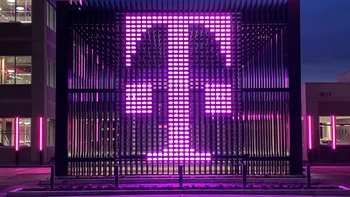Carriers are shutting down their 2G networks: here’s what that means for the world

At the beginning of October, it became known that one of the largest carriers in the US, T-Mobile, is taking yet another step towards the inevitable shutdown of its 2G mobile network by offering free phones to customers who are still relying on it.
Free phones are great for those who might be affected by the 2G network sunset, as the shutdown date Magenta has set is as early as April 2, 2024, but it is not only T-Mobile that is on this crusade to "kill" 2G — other carriers are also taking part.
So, what does this all mean in the grander scheme of things? That is exactly what we are here to talk about, and hopefully give you the insight you need, especially if you will be potentially affected by this change.
2G was the first digital telecommunication standard, while 1G (the first generation) was analog. Both, however, utilized digital signals to connect radio towers with the larger mobile infrastructure. What 2G introduced was the ability to have mobile data, enabling SMS messages and the ability to make safer phone calls that are digitally encrypted.
Now, the answer to the question "why" is a bit more nuanced. There are several reasons for carriers to make this decision and they are the following:
As mentioned earlier, you will have to get yourself a new phone. Make sure you first check in with your carrier to see whether they will give you one for free. Even if you are not offered a free upgrade, you might get a good price cut for the one you decide to purchase and/or for the plan you sign up for. If you have any other devices that are reliant on a 2G network you should contact the manufacturer to ask if they can offer you a discount.
Jump to:
- What is 2G?
- When and why are 2G networks shutting down?
- What will happen to existing 2G devices?
- How will the shutdown affect IoT (Internet of Things) devices using the 2G network?
- Will there be any cost implications for upgrading from 2G?
- What are the benefits of newer network technologies compared to 2G?
- How will the shutdown impact emergency services and older adults who might be using 2G devices?
What is 2G?
Whenever you see one of the networks such as 2G, 3G, or 5G and the upcoming 6G, the "G" simply stands for "generation", while the number tells us which mobile network generation is being addressed. The second mobile network generation, or 2G, was launched in 1991 (yeah, it's that old).
2G was the first digital telecommunication standard, while 1G (the first generation) was analog. Both, however, utilized digital signals to connect radio towers with the larger mobile infrastructure. What 2G introduced was the ability to have mobile data, enabling SMS messages and the ability to make safer phone calls that are digitally encrypted.
When and why are 2G networks shutting down?
Let's begin with the "when" part, which is quite simple since all carriers besides the aforementioned T-Mobile have already pulled the plug on their 2G networks, including AT&T in 2017, Verizon in 2020, and Sprint (which is part of T-Mobile since 2020) in 2021. T-Mobile is the only one that left parts of its 2G network intact, which means once April 2, 2024, comes around we will send off 2G into the sunset and watch it become part of our history.
Now, the answer to the question "why" is a bit more nuanced. There are several reasons for carriers to make this decision and they are the following:
- Maintenance costs — 2G (and 3G) uses different technology compared to 4G and 5G. This means carriers have to spend manpower and other resources for two separate systems, one of which has a user base that is quickly reducing. So from a financial standpoint, it makes sense to cut these legacy networks off.
- Opening up space for newer network generations — removing the 2G network opens up more frequency bands for deploying, which can be used to install more 4G and 5G antennas.
- Improved energy efficiency — newer cellular technology consumes less energy in order to operate, which can quickly add up to significant reductions in energy costs when applied nationwide.
What will happen to existing 2G devices and how can I prepare?
For all intents and purposes, all 2G devices will more or less be rendered useless, at least in terms of connecting to a mobile network. And by all, we really do mean ALL 2G devices including, but not limited to mobile phones, and IoT (Internet of Things) devices such as voice machines, smart meters, vehicle trackers, and more.
So far, 2G devices have been able to rely on T-Mobile's network, and they will continue to do so until April next year, but once T-Mo's 2G network goes dark there will basically be no 2G network for these devices to connect to.
The only way to prepare yourself for this is to upgrade to something newer. Whether it is one of those free 5G phones T-Mobile is giving out or investing in one yourself, it is the only way to ensure you are still able to communicate with others and connect to a mobile network.
Of course, the same goes for businesses that have continued to utilize 2G gadgets and devices up until now, with the main difference being that it will be much costlier and will require more time to carry out. April 2, 2024, might be far away enough for people who simply need to upgrade their phone and maybe one or two more devices, but it is a tight timeframe if you are a company. That is why it is advisable that all business begin their transition as soon as possible, as new components, the process of installing and integrating them can take a long time.
The only way to prepare yourself for this is to upgrade to something newer. Whether it is one of those free 5G phones T-Mobile is giving out or investing in one yourself, it is the only way to ensure you are still able to communicate with others and connect to a mobile network.
Of course, the same goes for businesses that have continued to utilize 2G gadgets and devices up until now, with the main difference being that it will be much costlier and will require more time to carry out. April 2, 2024, might be far away enough for people who simply need to upgrade their phone and maybe one or two more devices, but it is a tight timeframe if you are a company. That is why it is advisable that all business begin their transition as soon as possible, as new components, the process of installing and integrating them can take a long time.
How will the shutdown affect IoT (Internet of Things) devices using the 2G network?
You might be surprised to learn that around 15 billion of the IoT devices currently operating in the world depend on either 2G or 3G to send and receive information. Given that all major carriers besides T-Mobile have already completely shut down their 2G and 3G networks in the US, it goes without saying that many have already upgraded their old equipment to work with 4G and 5G.
If you have an IoT device or two that can only work on 2G or 3G, you might be able to install some additional parts that would make it compatible with the newer networks. If you can't modify your existing device to access 4G or 5G, then you would have to purchase a new one that supports either or both.
It is also important to check whether the M2M SIM card inside your device supports 4G. All M2M SIM cards in current IoT devices come with 4G support by default, but if you have a device that is too old it might not have come with one that does.
It is also important to check whether the M2M SIM card inside your device supports 4G. All M2M SIM cards in current IoT devices come with 4G support by default, but if you have a device that is too old it might not have come with one that does.
Will there be any cost implications for upgrading from 2G?
Thankfully, there are ways to relieve some of the financial costs that may come with upgrading to a 4G or 5G device. The Affordable Connectivity Program (ACP), offers up to $30 per month toward internet service for eligible households and up to $75 per month for households on qualifying Tribal lands. You can find the requirements and more potential benefits on the Affordable Connectivity Program page.
What are the benefits of newer network technologies compared to 2G?
There are more than a few benefits you get in return when upgrading from a 2G device to one that is compatible with the 4G and 5G networks. For starters, you will have a much more reliable network, meaning fewer connection issues and the hassle that comes along with that. You will also have much wider coverage compared to what 2G or even 3G networks offer, so you will have a network connection in more locations than before.
Let's not forget that one of the main improvements that come with a new network generation is the much higher data speeds and bandwidth, which makes everything work faster than before, improves call quality and allows us to stream video and audio content.
There is also the fact that most of the tech products capable of connecting to a cellular network nowadays rely on either 4G or 5G, which means that your brand new phone (or any other 4G/5G device) will be able to "communicate" and interact with the rest of the IoT (internet of things) world.
Let's not forget that one of the main improvements that come with a new network generation is the much higher data speeds and bandwidth, which makes everything work faster than before, improves call quality and allows us to stream video and audio content.
There is also the fact that most of the tech products capable of connecting to a cellular network nowadays rely on either 4G or 5G, which means that your brand new phone (or any other 4G/5G device) will be able to "communicate" and interact with the rest of the IoT (internet of things) world.
How will the shutdown impact emergency services and older adults who might be using 2G devices?
Some of us don't want to change or upgrade to the modern display-only mobile devices. Thankfully, there are 4G phones that keep that old-school design older generations know well and rely upon, so the transition doesn't have to be jarring. In fact, given the improved call quality, stability, and reception, they will probably find it a much better experience once they have tried it out.
Follow us on Google News













Things that are NOT allowed:
To help keep our community safe and free from spam, we apply temporary limits to newly created accounts: